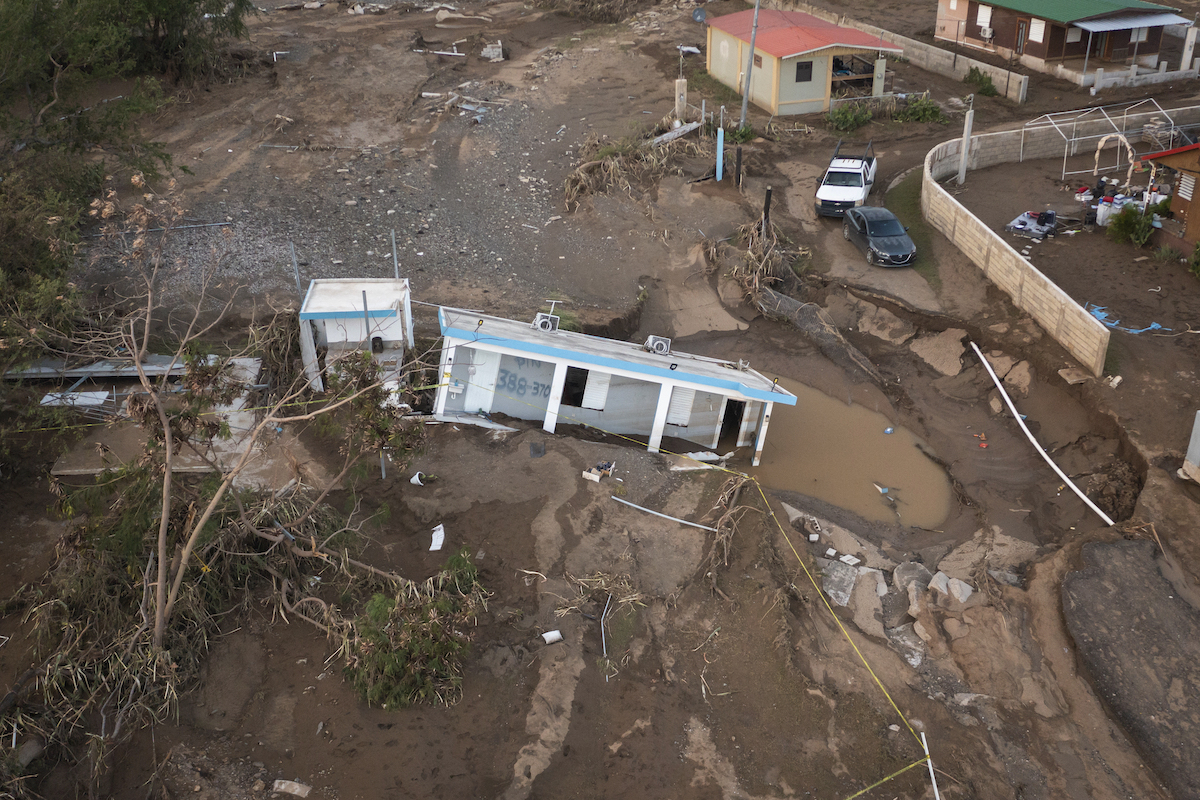

A house lays in the mud after it was washed away by Hurricane Fiona at Villa Esperanza in Salinas, Puerto Rico, Wednesday, September 21, 2022. (AP Photo/Alejandro Granadillo)
By DÁNICA COTO, Associated Press
SAN JUAN, Puerto Rico (AP) — Puerto Rico’s governor on Tuesday requested that the U.S. government waive a federal law to allow for more fuel shipments to the island amid concerns over a dwindling supply of diesel in the wake of Hurricane Fiona.
Gov. Pedro Pierluisi warned that a shortage of fuel would affect public health, security and government functions in the U.S. territory.
“Diesel supplies continue to decrease at a higher rate than previously anticipated, and shortages have been reported around the island,” he wrote.
The law that Pierluisi referenced is the Merchant Marine Act of 1920, best known as the Jones Act, which requires that all goods transported to Puerto Rico be aboard a ship built in the U.S., owned and crewed by U.S. citizens and flying the U.S. flag.
The law has been waived during previous storms, but U.S. President Joe Biden has not responded to Pierluisi’s petition.
Pierluisi’s letter comes as a British Petroleum ship with 300,000 barrels of diesel floats off Puerto Rico’s southern coast since Sunday, awaiting entry.
The archbishop of San Juan, Roberto González Nieves, also appealed to Biden to waive the law, saying the measure makes Puerto Rico’s recovery and rebuilding difficult because it drives up prices for materials.
He also said that despite officials claiming a majority of the island’s homes have power, “this does not match with our lived experience.”
“If this is not attended to immediately, we will face a deeper crisis in Puerto Rico,” he wrote in a letter to the president.
A group of Puerto Rico legislators, including the president of the island’s House of Representatives, were at a White House meeting with officials to urge a temporary waiver of the law amid concerns that elderly people could start dying like they did in the sweltering aftermath of Hurricane Maria, which struck as a Category 4 storm in September 2017.
“Every minute counts in an emergency,” said Puerto Rico Rep. Eddie Charbonier.
Local and federal officials have long called for a permanent repeal of the Jones Act, saying it has driven up prices and crippled Puerto Rico’s economy.
Pierluisi asked Biden for a waiver limited to the shipment of petroleum-derived products and liquefied natural gas to at least nine specific ports around the island.
“This specifically targeted and temporary relief would allow Puerto Rico to diversity its fuel sources, ease supply constraints and mitigate the risk of a fuel shortage in the middle of the response to the emergency caused by Hurricane Fiona,” he wrote.
The Category 1 storm slammed into the island’s southwest region on Sept. 18, sparking an island-wide blackout. As of Tuesday, power had been restored to more than 70% of 1.47 million clients, driving up demand for diesel as businesses, government agencies and homeowners continue to rely on generators.
During a press conference on Tuesday, Josué Colón executive director of Puerto Rico’s Electric Power Authority, surprised many as he became emotional and wiped away tears as he spoke.
“When you tell yourself, ‘We have to lift it up once again,’ you can’t stop thinking about family,’” he said, referring to the island’s power grid that was razed by Hurricane Maria in 2017 and pummeled by Fiona.
Government officials have said 77% to 91% of clients might have power by Friday, adding on Tuesday that the remaining 9% in areas hardest hit by Fiona could be connected soon.
“We hope within days,” said Daniel Hernández, an engineer with Luma, the private company that took over the island’s power transmission and distribution last year. “This is not María.”
However, the governor warned during the press conference that “we still have a lot to do to completely recover.”



[…] Source link #Puerto #Rico #Seeks #U.S #Waiver #Diesel #Dwindles […]